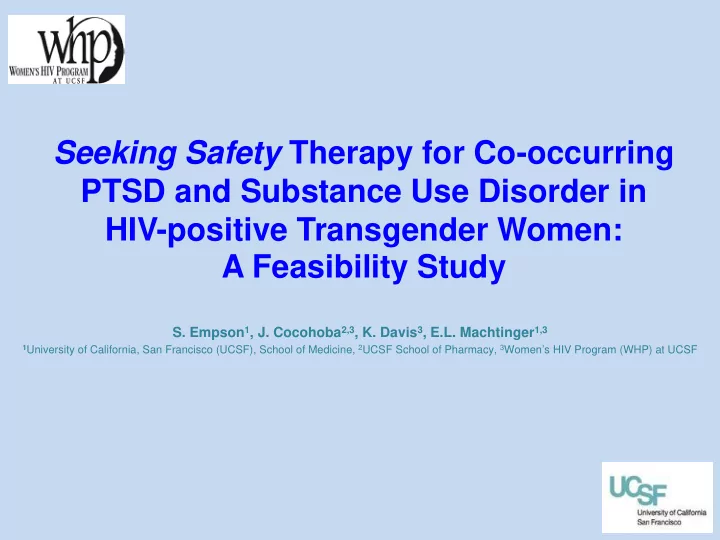

Seeking Safety Therapy for Co-occurring PTSD and Substance Use Disorder in HIV-positive Transgender Women: A Feasibility Study S. Empson 1 , J. Cocohoba 2,3 , K. Davis 3 , E.L. Machtinger 1,3 1 University of California, San Francisco (UCSF), School of Medicine, 2 UCSF School of Pharmacy, 3 Women’s HIV Program (WHP) at UCSF
Study Design Background Methods • Post-traumatic stress disorder (PTSD) and Participants substance use disorder (SUD) disproportionately • HIV-positive transgender women affect HIV-positive male-to-female transgender • Recent substance use women. • Recent or past trauma • Receiving care at either SFGH Ward 86 or Women’s • PTSD and SUD are associated with poor HIV- HIV Program (WHP) at UCSF related health outcomes and increased transmission-risk behaviors. Content • 12 of 25 Seeking Safety modules selected What is Seeking Safety ? • Modules selected by social worker/physician team • A flexible, manualized cognitive-behavioral based on appropriateness for HIV-positive therapy to treat co-occurring PTSD and SUD transgender women • Sessions lasted 2 hours, food provided • 25 individual modules • Emphasis on cognitive, behavioral, and Incentives interpersonal content areas • $180 for completion of 12 sessions • Allows for flexibility in: • Number of sessions/modules included Outcome Measures • Length of sessions • Demographic, health, and behavioral characteristics • Order of sessions • PTSD symptoms (PCL-C 17) • Individual vs. group format • HIV stigma (HIV Stigma Scale) • Choice of pre-approved materials • Drug and alcohol use (DAST-20, MAST-22) • Focus groups conducted post-intervention with • Materials are all pre-approved and un-alterable facilitators and participants. • Each session follows the same structured format
Results Participant Characteristics (n=7) Outcome Measures • African-American (71.4%) PTSD, HIV stigma, drug and alcohol use mean • Aged 42.3 years (SD=10.1) scores decreased post-intervention (Table 1). • On HAART (85.7%) • Sexually active (57.1%) At baseline (Table 2): • Earning < $1000/month (85.7%) • 71.4% met criteria for PTSD diagnosis • Receiving government-provided health • 71.4% had a self-identified drug problem insurance (100%) • 100% had a self-identified drinking problem Six participants (85.7%) completed > 7 sessions Post- Seeking Safety (Table 2): • 57.1% met criteria for PTSD diagnosis • 57.1% had a self-identified drug problem • 57.1% had a self-identified drinking problem Table 2: Seeking Safety Impact on PTSD and SUD Table 1: PTSD, Stigma, and Substance Use Mean Score (95% CI) Pre- Seeking Safety Post- Seeking Safety (n=7) (n=7) Pre- Seeking Safety Post- Seeking Safety 45.7 (31.6-59.9) 55.4 (41.1-69.8) PCL-C PTSD Diagnosis (PCL-C) 5 (71.4%) 4 (57.1%) 111.3 (86.8-135.8) 115.3 (94.5-136.1) HIV Stigma Drug Problem (DAST) 5 (71.4%) 4 (57.1%) 6.4 (0.1-12.8) 2.0 (-0.7-4.7) DAST 20 Drinking Problem (MAST) 7 (100.0%) 4 (57.1%) 5.4 (1.2-9.6) 7.1 (2.6-11.7) MAST 22
Conclusions Future Considerations Limitations Focus groups identified important areas of • Small sample size (limited about of data) consideration for future Seeking Safety • Neither the sessions nor the focus groups were Interventions: recorded • Participant focus groups were conducted by the • Appropriate module selection Seeking Safety facilitators • Amount and content of material included in each session • Session structure Conclusions • Role of incentives • Long-term impact Seeking Safety is feasible to conduct with HIV- positive transgender women and may reduce PTSD Module Domain Description symptoms and substance use. PTSD Taking Back Your Cognitive Causes and behaviors associated with PTSD Power Grounding Behavioral Skills to reduce emotional distress Larger studies should fully explore the potential for When Substances Control Cognitive Definition of substance abuse and dependence Seeking Safety to benefit HIV-positive transgender You and non-transgender women. Healing from Anger Interpersona Role of anger in PTSD and SUD l Taking Good Care of Yourself Behavioral Self-care and neglect Honesty Interpersona Role of honesty in trauma and SUD recovery l Compassion Cognitive Promotion of non-judgmental thinking Setting Boundaries Interpersona Setting healthy boundaries in relationships l Commitment Behavioral Strategies to improve follow-through Respecting Your Time Behavioral Time management skills Healthy Relationships Interpersona Identification of (un)healthy relationships l
Recommend
More recommend